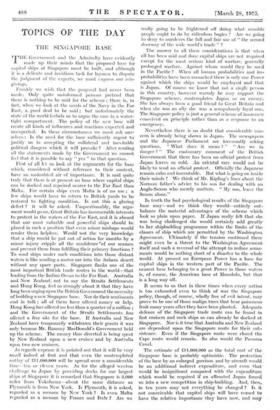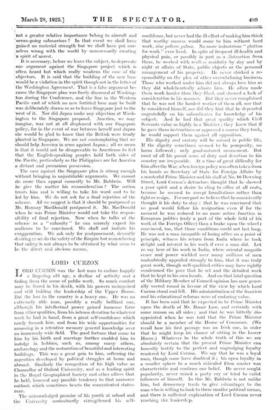TOPICS OF THE DAY
THE SINGAPORE BASE
THE Government and the Admiralty have evidently made up their minds that the proposed base for capital ships at Singapore must be built, and although it is a delicate and invidious task for laymen to dispute the judgment of the experts, we must express our mis- givings.
Frankly we wish that the proposal had never been made. Only quite uninformed persons pretend that there is nothing to be said for the scheme ; there is, in fact, when we look at the needs of the Navy in the Far East, a . good deal to be said ; but unfortunately the state of the world forbids us to argue the case in a water- tight compartment. The policy of the new base will create all kinds of influences and reactions expected and unexpected. In these circumstances we must ask our- selves : Is the need for the base sufficiently urgent to justify us in accepting the collateral and inevitable political dangers which it will provoke ? After reading all the statements made by the Government we cannot feel that it is possible to say " yes " to that question.
First of all let us look at the arguments for the base which, considered without reference to their context, have an undoubted air of importance. It is said quite truly that there is at present no base where capital ships can be docked and repaired nearer to the Far East than Malta. For certain ships even Malta is of no use ; a few ships would have to return to British yards to be restored to fighting condition. Is not this a glaring defect ? it will be asked. Unquestionably, the argu- ment would go on, Great Britain has innumerable interests to protect in the waters of the Far East, and it is absurd that our most valuable and powerful ships should be placed in such a position that even minor mishaps would render them helpless. Would not the very knowledge that a ship would be put out of action for months by a minor injury cripple all the confidence of our seamen and prevent them from fulfilling their primary functions ? To send ships under such conditions into those distant waters is like sending a motor car into the Sahara desert without any spare parts. Singapore flanks one of the most important British trade routes in the world—that leading from the Indian Ocean to the Far East. Australia and New Zealand, not to say the Straits Settlements and Hong Kong, feel so strongly about it that they have long been urging upon the British Government the necessity of building a new Singapore base. Nor do their sentiments end in talk ; all of them have offered money or help. Hong Kong has offered no less than a quarter of a million ; and the Government of the Straits Settlements has offered a free site for the base. If Australia and New Zealand have temporarily withdrawn their grants it was only because Mr. Ramsay MacDonald's Government held up the scheme. The money thus diverted is being spent by New Zealand upon a new cruiser and by Australia upon two new cruisers.
As regards expense it is pointed out that it will be very small indeed at first and that even the contemplated outlay of £11,000,000 will be spread over a considerable time--ten or eleven years. As for the alleged wanton challenge to Japan by providing docks for our largest ships at Singapore it is remarked that Singapore is 3,000 miles from Yokohama--about the same distance as Plymouth is from New York. Is Plymouth, it is asked, regarded as a menace by New York ? Is even Malta regarded as a menace by France and Italy ? Are we really going to be frightened off doing what sensible people ought to do by ridiculous bogies ? Are we going to deny to oursleves the full and fair use of "the second doorway of the wide world's trade " ?
The answer to all these considerations is that when all has beck, said and done capital ships are not required except for the most serious kind of warfare, generally prolonged warfare. Against whom would they be used in the Pacific ? When all human probabilities and im-• probabilities have been ransacked there is only one Power against which the ships would be employed and that is Japan. Of course we know that not a single person in this country, however warmly he may support the SingapOre scheme, contemplates Japan as an enemy. She has always been a good friend to Great Britain and when she was an ally she was a scrupulously loyal one. The Singapore policy is just a general scheme of insurance conceived on principle rather than as a response to an emergency.
Nevertheless there is no doubt that considerable con- cern is already being shown in Japan. The newspapers and the Japanese Parliament are incessantly asking questions. " What does it mean ? " " Are we in danger ? " The customary comment of the British Government that there has been no official protest from Japan leaves us cold. An oriental race would not be likely to send an official protest. Officially the Japanese remain calm and inscrutable. But what is going on inside their minds ? We think of Mr. Kipling's lines about the Norman father's advice to his son for dealing with an Anglo-Saxon who merely mutters. " My son, leave the Saxon alone."
In truth the bad psychological results of the Singapore base may—and we think they would—entirely out- balance the material advantages of the scheme which look so plain upon paper. If Japan really felt that she was being challenged she would certainly add greatly to her shipbuilding programme within the limits of the classes of ship which are permitted by the Washington Agreement. Ultimately if the tension continued there might even be a threat to the Washington Agreement itself and such a reversal of the attempt to reduce arma- ments would be nothing short of a disaster to the whole world. At present no European Power has a base for capital ships in the western part of the Pacific. The nearest base belonging to a great Power in those waters is, of course, the American base at Honolulu, but that is a long way off.
It seems to us that in these times when every nation is too exhausted even to think of war the Singapore policy, though, of course, wholly free of evil intent, may prove to be one of those malign trees that bear poisonous fruit many years after they have been planted. Adequate defence of the Singapore trade route can be found in fast cruisers and such ships as can already be docked at Singapore. Nor is it true that Australia and New Zealand are dependent upon the Singapore route for their sub- sistence. Even if the Singapore route were closed the Cape route would remain. So also would the Panama Canal.
The estimate of £11,000,000 as the total cost of the Singapore bas. e is probably optimistic. The protection! of the base by an enlarged garrison and by aircraft would be an additional indirect expenditure, and even that would be insignificant compared with the expenditure. which would be required if an affronted Japan forced us into a new competition in ship-building. And, then, , in ten years may not everything be changed ? Is it not conceivable that capital ships will have ceased to have the relative importance they have now, and may not a greater relative importance belong to aircraft and ocean-going submarines ? In that event we shall have gained no material strength but we shall have put our- :selves wrong with the world by unnecessarily creating ?a spirit of unrest. ' It is necessary, before we leave the subject, to deprecate one argument against the Singapore project which is often heard but which really weakens the case of the objectors. It is said that the building of the new base would be a violation in the spirit though not in the letter of the Washington Agreement. That is a false argument be- cause the Singapore plan was freely discussed at Washing- ton during the Conference, and the line in the Western Pacific east of which no new fortified base may be built :was deliberately drawn so as to leave Singapore just to the west of it. Nor did Japan make any objection at Wash- ington to the Singapore proposal. America, we may imagine, was not at all displeased with our Singapore policy, for in the event of war between herself and Japan she would be glad to know that the British were firmly .planted in Singapore. We are not contemplating that we should help America in arms against Japan ; all we mean is that it would not be disagreeable to Americans to feel that the English-speaking peoples hold both sides of the Pacific, particularly as the Philippines are for America a distant and precarious possession.
The case against the Singapore plan is strong enough without bringing in unjustifiable arguments. We cannot do more than appeal earnestly to Mr. Baldwin. Will he give the matter his reconsideration ? The nation trusts him and is willing to take his word and to be led by him. We do not ask for a final rejection of the scheme. All we suggest is that it should be postponed as Mr. Ramsay MacDonald postponed it. Mr. MacDonald when he was Prime Minister would not take the respon- sibility of final rejection. Now when he talks of the scheme as a " calamity " he can scarcely expect his audience to be convinced. We shall not imitate his exaggeration. We ask only for postponement, devoutly desiring as we do the safety of the Empire but remembering that safety is not always to be obtained by what seem to be the direct and obvious means.















































 Previous page
Previous page